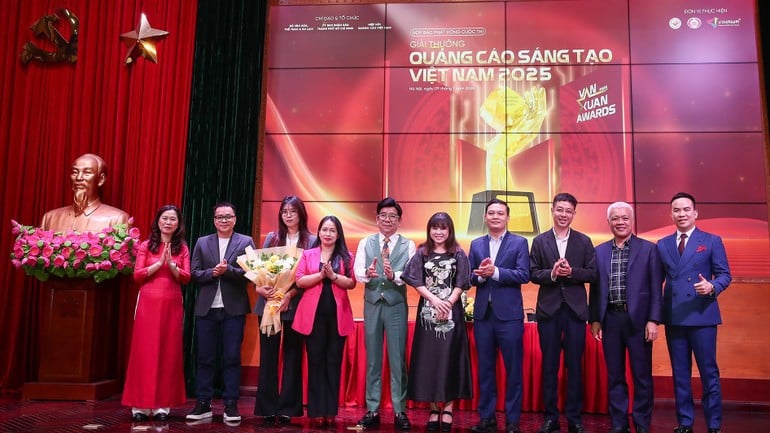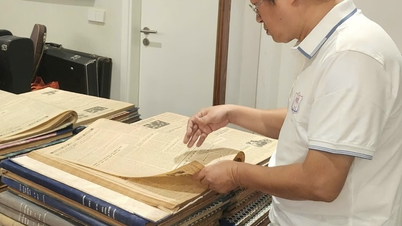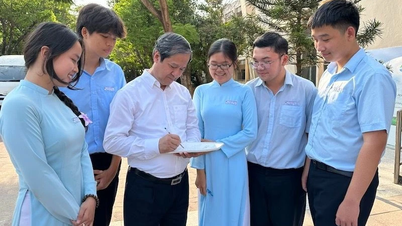
These changes help remove barriers in records and procedures, and open up a new step in management, when State agencies accompany businesses in the digital age.
Reporter of Nhan Dan Newspaper had an interview with Director of the Department of Grassroots Culture, Family and Library (Ministry of Culture, Sports and Tourism) Ninh Thi Thu Huong, to clarify the outstanding innovations in the revised Law on Advertising this time.
Reporter: Mr. Director, what changes are expected to be brought to businesses and management agencies by shortening the advertising notification process in this revised Law?

Director of the Department of Grassroots Culture, Family and Library Ninh Thi Thu Huong: The Law amending and supplementing a number of articles of the Law on Advertising has simplified the procedure for notifying advertising products, specifically: Shortening the time for sending notifications, helping businesses save time and costs when advertising. In addition, a number of components of the dossier will be abolished that are no longer suitable for the digitization and digital transformation of administrative procedures such as: Copy of the business registration certificate of the organization or individual requesting a license to build an advertising work; location lease contract between the investor of the advertising work and the owner or legal user of the advertising work attached to an existing construction work; document announcing the winning bid results...
In addition, the Law supplements regulations on organizations and individuals owning advertising works to be responsible for quality, safety and compensation for damage, helping businesses proactively manage risks, reduce disputes, enhance reputation and social responsibility. This is consistent with the policy of administrative reform, creating a favorable business environment for businesses and improving the effectiveness of state management of advertising.
Reporter: From practical implementation, what are the biggest shortcomings in previous advertising procedures that the new Law has effectively overcome, Director?
Director of the Department of Grassroots Culture, Family and Library Ninh Thi Thu Huong: From the practical implementation of the 2012 Advertising Law, it can be seen that there are some major shortcomings in advertising procedures that the Law amending and supplementing a number of articles of the Advertising Law has effectively overcome.
First of all, the Law amending and supplementing a number of articles of the Law on Advertising has reviewed and abolished the components of the dossier for notifying inappropriate advertising products, reducing the time for administrative procedures. At the same time, the new law strengthens decentralization and delegation of power to local authorities in advertising management, clearly defining the responsibilities of each level, ensuring unified and smooth procedures.

Second, the regulation excluding two groups of non-advertising content in the Law amending and supplementing a number of articles of the Law on Advertising has overcome the situation where the scope of the concept of "advertising" in the 2012 Law on Advertising is too broad, causing many sales support activities such as product description documents, display catalogs or mandatory information on labels and packaging to be considered advertising and require permission and notification. This exclusion helps to clearly define the boundary between advertising and mandatory legal information, reduce administrative burdens for businesses, and improve the efficiency and transparency of State management.
Third, the Law amending and supplementing a number of articles of the Law on Advertising has added specific provisions on obligations and legal responsibilities for platforms providing online advertising services, forcing them to comply with Vietnamese law when doing business in Vietnam, and at the same time, clearly defining the responsibilities of "advertising product carriers", including influencers (KOLs/KOCs). They must verify product information before advertising, and must not promote products they have not used or do not fully understand, helping management agencies have effective tools to handle violations in cyberspace, prevent false advertising and protect consumers.
Fourth, the new Law helps replace pre-control with post-control: Previously, many types of goods and services required confirmation of content before implementation, causing waste of time and costs. The Law amending and supplementing a number of Articles of the Advertising Law has abolished the requirement to confirm advertising content of some special types of goods and services, switching to a post-control mechanism, reducing the burden of administrative procedures for businesses.
Reporter: In the coming time, what solutions will the Ministry of Culture, Sports and Tourism continue to have to promote administrative reform, ensuring advertising activities are both transparent and convenient for businesses, Mr. Director?
Director of the Department of Grassroots Culture, Family and Library Ninh Thi Thu Huong: In the coming time, the Ministry of Culture, Sports and Tourism will continue to implement many synchronous solutions to promote administrative reform in the field of advertising, ensuring advertising activities are both transparent and convenient for businesses, with 4 key solutions.
The first is to complete the guiding legal framework. The Ministry of Culture, Sports and Tourism has advised and submitted to the Government to issue a Decree guiding the Law on Advertising in 2025 to take effect at the same time as the Law amending and supplementing a number of Articles of the Law on Advertising. The drafting of the Decree also continues the viewpoint of cutting down and simplifying unnecessary procedures, retaining only the regulations that are really necessary to effectively manage advertising activities.
In addition, it is necessary to actively propagate and disseminate the law. The Ministry of Culture, Sports and Tourism publicizes legal information on advertising on mass media; organizes conferences and training courses to thoroughly educate the staff working in advertising management from central to local levels, ensuring consistency in law enforcement, and raising awareness of compliance among entities participating in advertising activities.
Next, it is necessary to strengthen post-inspection and handling of violations: Inspection and examination of compliance with advertising laws will be strengthened at both central and local levels. Illegal advertising activities will be detected and handled to deter violators and protect legitimate, law-abiding businesses.
And finally, it is necessary to promote the implementation of e-Government, integrating the procedures for notifying advertising products into the Online Public Service Portal. Currently, the procedures for notifying advertising products on billboards and banners have been provided on the National Public Service Portal for businesses to submit documents online. In the coming time, the Ministry will continue to digitize the process of receiving and processing advertising product notifications, building a database and advertising management system to help businesses carry out procedures conveniently and publicly; prevent negativity and improve transparency.
In short, with strong administrative procedure reform and synchronous management solutions, the Ministry of Culture, Sports and Tourism expects that advertising activities in the coming time will be both transparent for businesses, while still ensuring the effectiveness and efficiency of State management, building a healthy advertising environment, and making positive contributions to the socio-economic development of the country.
Reporter: Thank you very much, Director!
Source: https://nhandan.vn/cai-cach-hanh-chinh-trong-hoat-dong-quang-cao-post915939.html


![[Photo] General Secretary To Lam attends the 95th Anniversary of the Party Central Office's Traditional Day](https://vphoto.vietnam.vn/thumb/1200x675/vietnam/resource/IMAGE/2025/10/18/1760784671836_a1-bnd-4476-1940-jpg.webp)



![[Photo] Collecting waste, sowing green seeds](https://vphoto.vietnam.vn/thumb/1200x675/vietnam/resource/IMAGE/2025/10/18/1760786475497_ndo_br_1-jpg.webp)



























































































Comment (0)